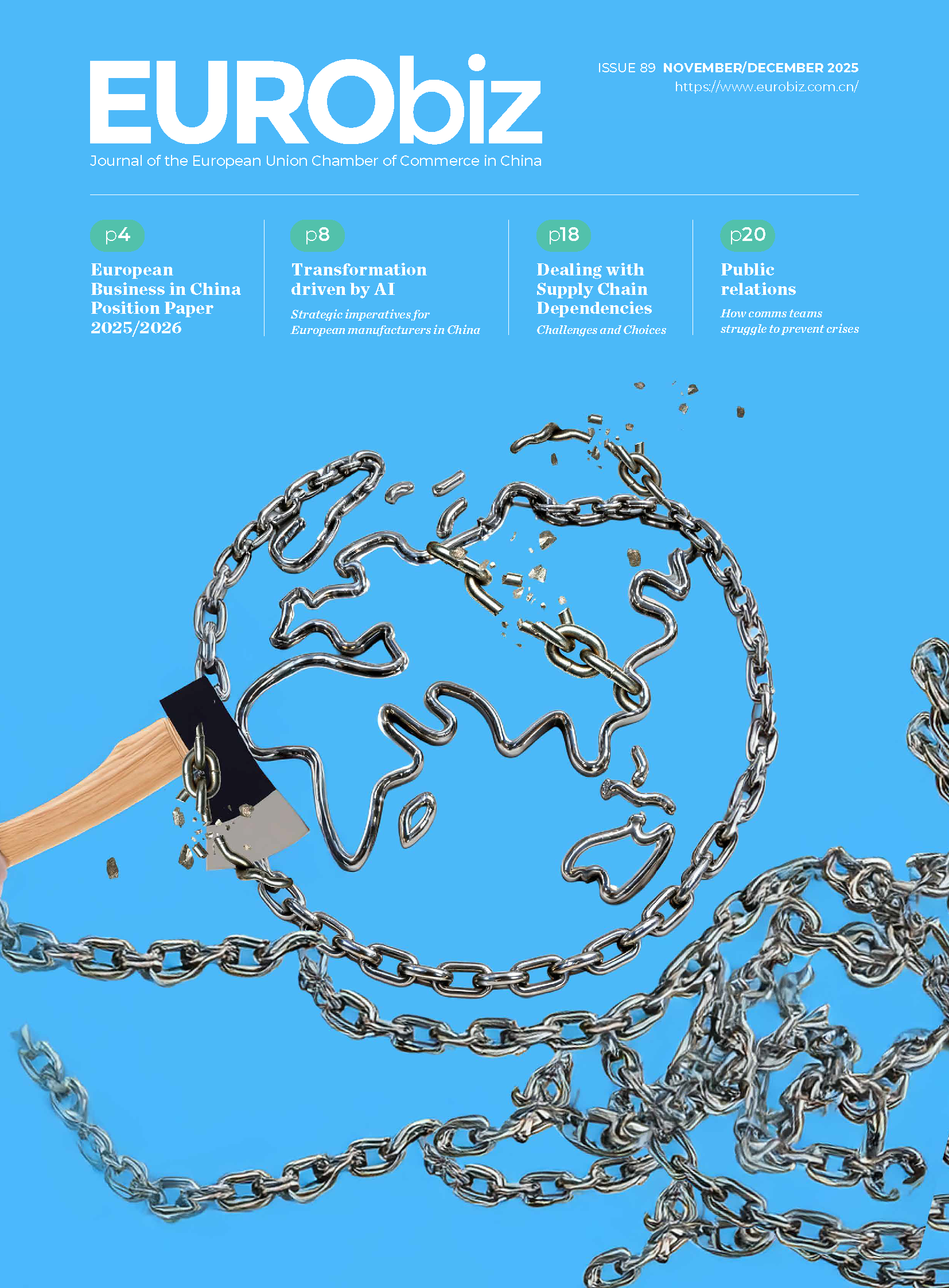
What European business leaders must know in 2025
Over the past 25 years, China has transformed from being the world’s low-cost manufacturing hub into a high-value, digital talent market. This evolution has profound implications for European companies operating in China says Roland Brouwer, particularly in the areas of human resources (HR), talent acquisition and long-term business strategies.
When the European Chamber was founded 25 years ago, China was widely considered the ‘workshop of the world’ – a vast, low-cost labour hub powering global supply chains. For European businesses, the appeal was straightforward: efficiency, speed and scale.
Today, this picture has shifted dramatically. Labour costs have increased, employee skills have improved and workforce expectations are higher than ever. HR is no longer just an operational function – it has become a strategic lever for growth, innovation and long-term competitiveness. Companies must now consider talent strategy as a core component of their overall business strategy in China.
Phase one: Cost and scale (early 2000s)
In the early 2000s, China’s workforce powered its economic miracle. Millions of migrant workers moved from rural areas to coastal cities to work in factories. For many, a stable job with regular pay was sufficient. HR departments focussed mainly on payroll, contracts and compliance, with high turnover being the norm. Labour was plentiful, and recruitment was often described as ‘a queue at the factory gate’.
During this period, European businesses benefited from low-cost labour and rapid production scalability. Talent development, career progression and retention strategies were minimal. The priority was production efficiency rather than strategic HR management.
Phase two: Policy reform and rising talent (mid-2000s to 2010s)
The 2008 Labour Contract Law marked a turning point. Employment rights were strengthened, compliance became essential, and HR had to move from reactive administration to proactive strategic planning.
Meanwhile, China’s talent pool began to evolve. A new generation of digitally savvy, university-educated workers entered the market. They sought career growth, skill development and meaningful work, not just job security. European companies had to pivot their HR practices: offering structured training programmes, career progression and stronger employee engagement.
This period also saw the emergence of employer branding in China. Firms that invested early in building a strong reputation among talent gained a competitive advantage in attracting and retaining employees. For many European companies, this was a critical learning phase – realising that people strategy is as important as operational efficiency.
Phase three: A sophisticated, high-value talent market (2020s–2025)
Fast forward to today, China offers one of the largest pools of highly educated, digital-native talent in the world. Competition for talent—both local and foreign—is intense, particularly in areas like technology, research and development, digital transformation and green energy.
Key trends European CEOs and HR leaders should know
- Gen Z workforce expectations: Salary alone is no longer sufficient to attract top talent. Flexibility, autonomy, purpose, environmental, social and governance (ESG) alignment, and career development are now baseline expectations.
- Digital recruitment platforms: Companies must meet candidates where they ‘live’ online. WeChat, Douyin, and Xiaohongshu have become essential for employer branding and recruitment marketing.
- Regional talent shifts: Tier-two and tier-three cities, such as Chengdu, Suzhou and Wuhan, offer strong technical talent, lower living costs and higher employee loyalty. European firms must increasingly leverage these locations for sustainable growth.
Talent today is a strategic differentiator. Companies that fail to align their HR and business strategies with these trends risk losing their competitive advantage.
Lessons from 25 years: Strategic HR success in China
European companies that have thrived in China share common approaches:
- A localised HR strategy
Global policies cannot be applied directly. Companies must adapt to local labour laws, cultural norms and generational expectations. - Building a strong employer brand
Visibility is critical, both online and offline. Your employee value proposition (EVP) must resonate with Chinese talent, highlighting opportunities for growth and meaningful work. - Development of talent pipelines
Partnerships with universities, internships and leadership programmes help secure a steady flow of high-quality talent and strengthen an employer’s reputation. - Investments in talent retention
Providing growth opportunities, purpose-driven work and wellbeing benefits reduces turnover and improves overall workforce stability.
Looking ahead: China’s labour market beyond 2025
Demographic pressure
China’s ageing population and shrinking workforce will increase competition for young talent. Companies must strategically plan succession, skills development and cross-generational collaboration.
Technology and automation
Artificial intelligence-driven HR, predictive analytics and automation are transforming workforce management. European businesses must embrace digital HR solutions to remain competitive.
ESG and purpose-driven work
Employees, especially those from younger generations, increasingly expect companies to align with sustainability, social impact and corporate responsibility. Integrating ESG principles into HR and business strategy is now a differentiator.
Regional expansion opportunities
Second- and third-tier cities are growing in importance. These markets offer untapped talent pools, lower operational costs and opportunities for long-term, sustainable growth.
Conclusion: People strategy equals business strategy
The evolution of China’s labour market is no longer about cheap labour – it is about capability, innovation and strategic talent management. European companies that invest in people, embrace digital HR transformation and adapt to China’s fast-changing socio-economic landscape will thrive in the coming decades.
Key takeaways for European businesses:
- Invest in talent and company culture;
- Embrace digital HR and recruitment strategies;
- Localise HR practices to Chinese regulations and culture;
- Leverage regional cities for sustainable growth; and
- Align business with ESG and purpose-driven values.
Roland Brouwer is the regional director for Europe at BIPO, a global HR and payroll solutions provider. He helps European companies navigate regulatory, cultural, and talent-related challenges in China and Asia.
BIPO is a global provider of payroll and people solutions, supporting businesses across 160+ markets. With strong expertise in Asia and Europe, BIPO combines local compliance knowledge with cloud-based HR technology, enabling organisations to manage global workforces efficiently and remain competitive.


Recent Comments